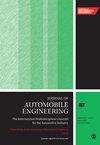涉及纵向运动、动力总成和空调系统优化的协同能量优化控制
IF 1.5
4区 工程技术
Q3 ENGINEERING, MECHANICAL
Proceedings of the Institution of Mechanical Engineers Part D-Journal of Automobile Engineering
Pub Date : 2024-09-14
DOI:10.1177/09544070241272899
引用次数: 0
摘要
本文主要研究连接式四轮轮毂驱动电动汽车(EV)的纵向控制、动力总成和空调(A/C)系统的优化控制策略。本文开发了一个分层控制框架,以提高车辆的能源经济性。上层利用实时连接信息来确定行驶模式。然后,提出一个多目标运动规划系统(MOMPS)来规划最佳加速轨迹。在下层,采用离线全局优化方法,找到能使总功率损失最小的扭矩组合。拟议的空调控制器基于双层模型预测控制(Bi-level MPC)算法运行。开发了一个新颖的预测模型,使空调系统能够利用车辆速度降低能耗。利用城市测试道路数据对 MOMPS 的性能进行了评估,结果表明,与全局动态编程(Global DP)和智能驾驶员模型(IDM)相比,MOMPS 可以平衡多个目标。此外,与平均扭矩分配策略相比,所提出的扭矩分配策略可实现 4.98% 的节能率。此外,与保持恒定设置的基线策略相比,本文提出的空调控制器可将能耗优化 13.57%。本文章由计算机程序翻译,如有差异,请以英文原文为准。
Cooperative energy optimal control involving optimization of longitudinal motion, powertrain, and air conditioning systems
This paper is concerned with the optimal control strategies for the longitudinal control, powertrain, and air conditioning (A/C) system of connected four-wheel hub-drive electric vehicles (EVs). A hierarchical control framework is developed to enhance the energy economy of the vehicle. Real-time connected information is utilized in the upper layer to determine the travel mode. Then, a multi-objective motion planning system (MOMPS) is proposed to plan the optimal acceleration trajectory. In the lower layer, an offline global optimization approach is employed to find the torque combinations that minimize the total power loss. The proposed A/C controller operates based on the bi-level model predictive control (Bi-level MPC) algorithm. A novel prediction model is developed to enable the A/C system to decrease energy consumption by leveraging the speed of the vehicle. The performance of the MOMPS is evaluated using urban test road data, demonstrating that the MOMPS can balance multiple objectives compared to global dynamic programing (Global DP) and the intelligent driver model (IDM). In addition, the proposed torque distribution strategy results in a 4.98% energy-savings rate through comparison with the even torque distribution strategy. Moreover, the A/C controller proposed in this paper can optimize energy consumption by 13.57% compared to a baseline strategy that maintains a constant setting.
求助全文
通过发布文献求助,成功后即可免费获取论文全文。
去求助
来源期刊

CiteScore
4.40
自引率
17.60%
发文量
263
审稿时长
3.5 months
期刊介绍:
The Journal of Automobile Engineering is an established, high quality multi-disciplinary journal which publishes the very best peer-reviewed science and engineering in the field.
 求助内容:
求助内容: 应助结果提醒方式:
应助结果提醒方式:


